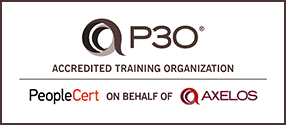Course Description
A P3O® model provides a decision enabling/delivery support structure for all change within an organization. This may be provided through a single permanent office which may exist under several different names, for example, Portfolio Office, Centre of Excellence, Corporate Programme Office. It may otherwise be provided through a linked set of portfolio, program, and project offices. A P30 is essential for ensuring successful outcomes through the delivery of portfolios, programs, and projects.
This course is delivered by a Peoplecert approved trainer with practical experience in project management.
Exam Certification
The exam certification is accredited by Peoplecert on behalf of Axelos. Training and exam certification is included in the cost of this course.
Pre-requisites
Delegates should spend approximately 10 hours pre-study in order to be well prepared for the course.
Target Audience
- Managers who need a structure for working alongside corporate organisational investments.
- Individuals moving into a P3O® role, or existing portfolio, programme or project office roles.
- Team members employed within or alongside a support office.
- Anybody who needs to know the basics about providing portfolio, programme and project support.
- Project Managers keen to develop their skills and identify opportunities for career advancement.
- Any Support offices that may be known by a variety of titles such as: Portfolio Office, Centre of Excellence, Enterprise or Corporate Programme Office.
Course Objectives
By the end of the course, delegates will be able to:
-
- Explain the P3O® model and state the key functions and services of a P3O®.
- Explain which P3O® model is most appropriate to your organisation’s strategic objectives.
- Know the arguments for establishing a P3O® model and measuring its success.
- Know the roles and responsibilities associated with a P3O® service.
- Describe the tools and techniques used by a P3O®.
- Understand and describe the relationships between strategy, portfolio, programme and project, and how these different.
relationships affect management issues.
- Help delegates to operate effectively with colleagues and managers in a structured environment.
Course Outline
Structured Approach to Managing Projects
- Setting the scene for a structured approach to managing all projects.
Overview and Principles
- Definitions: portfolio, programme, project; elements of a P3O® model
- The decision-supporting role and governance responsibility of a P3O®; analysing the effectiveness of the P3O® in assuming this role and these responsibilities
- Characteristics of a mature P3O®
- The differences between portfolio, programme and project offices.
Business Case for a P3O®
- Why invest in a P3O®?
- “Doing the right programmes/projects” versus “doing programmes and projects right‟ and the differences between them
- P3O® value matrix
- KPIs and their measurement.
P3O® Models and Tailoring
- Functional areas of a P3O®, including the skills and competences required
- Functions and services delivered by a P3O®
- Relationships with other corporate function offices
- Information assurance, including resource provision by a P3O®
- Sizing a P3O®, including different model types
- Impact of maturity on P3O® implementation.
Implementation
- Components of the permanent P3O® model lifecycle
- Definition stage of the permanent P3O® lifecycle
- Capability maturity, P3O® tools and techniques
- Blueprint: information flows and reporting requirement
- Temporary versus permanent P3O® model
- Key areas of focus of a temporary programme or project office.
Tools and Techniques
- Utilisation of tools and standard P3O® techniques
- CSFs for tools and techniques
- Collaborative integrated tools; enterprise tools
- Objectives and benefits of: portfolio prioritisation and optimisation; management dashboards; knowledge management; information portal; facilitation-workshop techniques; skills development and maintenance
- Knowledge management techniques
- Types of facilitated workshops
- “Swimlane” models - benefits and use.
Roles
- Management, generic and functional-based purpose of P3O® roles.
Exam Information
Foundation: 1 hour, closed book, 75 multiple-choice questions.
Passing the exams will give you internationally recognized professional qualifications.

